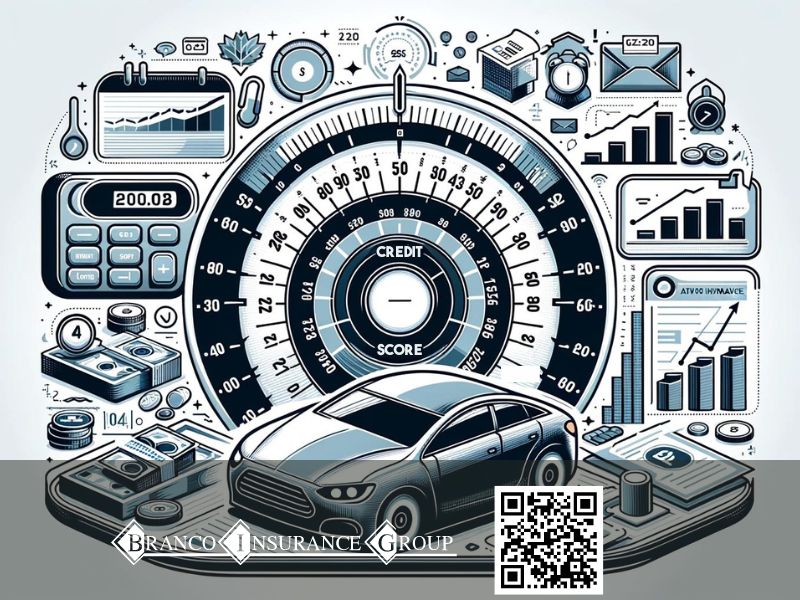Credit scores play a pivotal yet often overlooked role in calculating auto insurance rates. In most states, insurers factor in drivers’ credit scores when assessing premiums, despite no direct relation to one’s driving ability. This practice stems from actuarial data suggesting individuals with lower credit scores tend to file higher insurance claims. However, some consumer advocates contend using credit information to determine car insurance rates can prove discriminatory.
Understanding the nuances around credit scores and auto insurance is essential, as maintaining favorable credit can substantially lower your rates. This guide examines how scores influence premiums, how to improve your credit rating, and techniques to secure affordable coverage even with poor credit.
How Credit Scores Affect Car Insurance Rates
Insurers don’t use generic credit scores but rather insurance-specific variants called credit-based insurance scores (CBIS). These customized ratings aim to predict policyholder risk, focusing on aspects like payment history and debts rather than income details. Weighing factors differently than conventional credit scores gives insurers insight into your likelihood of filing insurance claims.
The Basis of Credit-Based Insurance Scores
- Payment history: Consistent timely payments suggest financial responsibility.
- Total outstanding debts: Significant debts raise perceived claim risk.
- Length of credit history: A longer positive history indicates lower risk.
- Recent credit applications: Numerous recent applications may signify a riskier financial position.
- Types of credit used: A mix of credit types (mortgages, credit cards, etc.) is ideal.
Insurers input this data into confidential CBIS formulas, producing scores conveying perceived claim risk. Drivers with lower CBIS typically face steeper rates.
State Regulations on Using Credit for Insurance
Laws surrounding the usage of credit for insurance vary significantly nationwide. California, Hawaii, Massachusetts, and Michigan prohibit this practice when calculating premiums. Some states permit referencing credit but limit its weight when setting rates. Most jurisdictions allow factoring credit scores into prices without restrictions. Understanding your state’s regulations provides transparency into how scores influence your premiums.
Premium Impacts of Credit on Car Insurance
Actuarial tables clearly demonstrate substantially higher average premiums for lower credit tier policyholders compared to drivers boasting excellent credit. According to 2021 insurer filings analyzed by Quadrant, national average annual rates stood around:
- Exceptional credit: $2,200
- Good credit: $2,556
- Average credit: $2,800
- Poor credit: $4,801
This data shows a typical spread of over 118% between premium extremes. Image paying $3,500+ extra yearly for insurance due to poor credit! Comparing across states unveils further striking discrepancies by credit bracket.
For example, Washington D.C. tops the country for rate hikes stemming from unfavorable credit at an incredible 249% over drivers with excellent histories. Multiple factors create geographical rate deviations like local risk, regulations, weather, traffic, population density, and more. Understanding baseline premium spreads in your state provides perspective on the potential savings available from improving credit.
How to Improve Your Credit Score
Given the sizable rate hikes possible from poor credit, focusing on credit score improvement makes smart financial sense for most drivers. Boosting your rating even modestly can yield hundreds in annual savings. While climbing the credit ladder takes time, positive results manifest through simple consistent actions.
Make Timely Bill & Debt Payments
Payment history constitutes the largest component of credit calculations. Set payment reminders to avoid late fees and score damage. If necessary, consider enrolling bills in autopay programs. Showing fiscal accountability keeps your credit score solid.
Minimize Credit Report Errors
Fixing credit report mistakes directly raises your score, and millions of Americans have errors. Regularly check reports from Equifax, TransUnion, and Experian. Dispute inaccuracies with credit bureaus for prompt corrections. This free monitoring protects your rating.
Maintain Low Credit Utilization Ratio
Experts recommend keeping credit usage below 30% of available limits. High utilization signals risk, negatively affecting your score. Ask issuers for higher limits without increasing spending to reduce this ratio. Limit the use of multiple cards together, as aggregate balances factor into calculations.
Monitor Credit Score & Report Frequently
Stay updated on your rating with free monitoring services through issuers and third-parties like Credit Karma. This lets you catch problems early and view real-time improvement from positive credit habits. Enable alerts on bureaus’ sites for big report changes.
Alternatives for Drivers With Poor Credit
While improving credit should remain the ultimate objective, those with lackluster histories still deserve affordable coverage. Insurers face restrictions barring denial of applicants due to credit alone. Furthermore, policies legally must satisfy state minimum liability limits.
Shop thoroughly even with poor credit. Geico provides America’s most affordable premiums specifically for low credit drivers at $1,750 annually on average. Contrastingly, auto owners topped rates for this demographic at an eye-watering $3,970 per year! Comparing insurance quotes lets those with poor credit save substantially.
Usage-Based Insurance Programs
Telematics plans through Progressive, Allstate, and others base premiums on driving habits via vehicle data instead of credit. Excellent driving could offset rate hikes from low scores. However, privacy concerns exist over extensive vehicle tracking.
Multi-Policy & Other Discounts
Bundling home or renters coverage with your car insurance may yield discounts countering poor credit impacts. Similarly, paying premiums upfront rather than monthly saves over 12% typically. Avoid potential fees from recurring payments. Inquire about other discounts to maximize savings.
Key Takeaways
Credit-based insurance scores, rather than general credit scores, are used to assess risk levels and calculate premiums. These specialized scores weigh factors like payment history and debts differently.
Laws vary significantly by state regarding the use of credit data for insurance purposes. Four states prohibit the practice entirely, while most permit it without restrictions.
The impacts of credit on car insurance premiums are substantial. On average, drivers with poor credit pay 118% higher rates nationally than those with exceptional histories.
Improving credit scores, even modestly, can yield significant savings on annual premiums. Strategies include making timely payments, minimizing errors on credit reports, keeping credit utilization low, and monitoring your score.
For drivers with poor credit, shopping extensively for quotes and considering usage-based insurance and multi-policy discounts can help partially offset the higher rates resulting from low scores.
Maintaining good credit remains imperative for maximizing auto insurance affordability. However, drivers with poor credit can still find ways to secure essential coverage within their budget limitations, albeit potentially at higher rates.
The Bottom Line
Undoubtedly, auto insurance stands as a mandatory expense, especially for drivers boasting less-than-perfect credit. However, understanding the landscape around how credit ratings influence premiums creates transparency. This allows consumers to pinpoint areas needing improvement and secure the most affordable coverage through informed policy purchasing decisions.
Final Thoughts
At Branco Insurance Group, our top priority is providing exceptional service and tailored coverage to protect what matters most – your family, business, vehicles, and more. Whether you need to insure your home, auto, motorcycle, boat, or other assets, we take pride in getting to know each client personally so we can offer policies personalized to your unique needs and budget.
With over 16 years of serving our local community, we have developed lasting relationships and now consider many clients part of our extended family. We don’t just see you as another customer – we truly care about your well-being. That includes helping ensure you have adequate auto insurance to protect your vehicles in the event of an accident or theft. We will always go the extra mile to guarantee you, your loved ones, your assets, and your livelihood remain safe and secure for years to come.
If you’re looking for a local insurance agency built on genuine care and integrity, contact us today. We would be honored to add your family to our own and protect the vehicles and things that mean the world to you. Call or visit anytime to speak with our friendly experts about your insurance needs.





